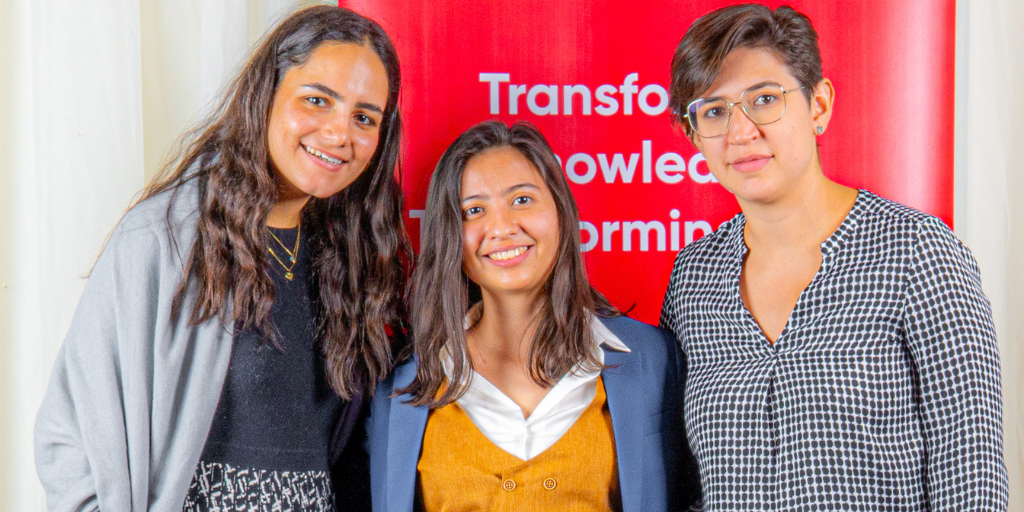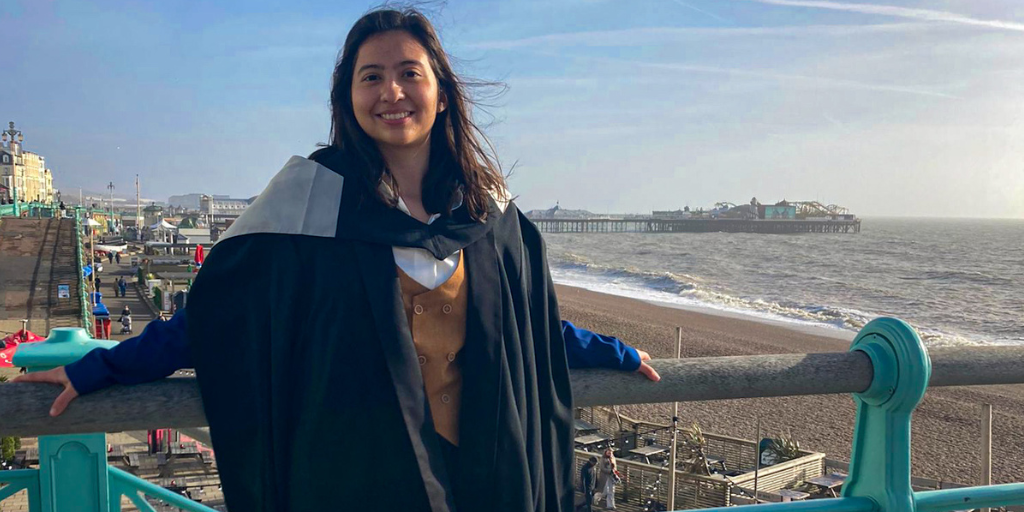Ana Palma Garcia’s dissertation that focused on exploring the experiences of deaf women in Colombia has come first place in the Development Studies Association Masters Dissertation Prize.
Ana, who studied MA Power, Participation & Social Change, also won the IDS Best Overall Dissertation and Best Overall Performance awards in the class of 23. She tells us why she chose to study this degree and how she plans to apply the methodologies she has learnt to her social change work.

The name of the programme immediately caught my attention. Because of its unconventional title I knew it would have the bold and innovative curriculum I was looking for. It was this unapologetic divergence from traditional academic names and modules which set it apart from other master’s programmes in the field of anthropology of development that intrigued me.
I applied because I was looking for a programme that wasn’t afraid to critically examine academia and challenge prevailing discourses of international development. I wanted to learn from researchers who don’t distance themselves from their emotions and human experiences to seem objective, but rather embrace them as integral components of their work to make participatory processes more authentic, relatable, and sustainable. I hoped to find a community of scholars who, like myself, remained stubbornly hopeful amidst the challenges of our times. And MAPP (MA Power, Participation & Social Change) felt like the right place to find all of that.
A rich heritage of participatory action research
I was pleasantly surprised by how deeply rooted this course is in Latin American epistemologies.
Before coming to the UK, I was wary about pursuing a master’s in development outside Latin America, fearing it might diverge from the principles of decolonialism and the emphasis on critical reflexivity inherent in the anthropological practices of Colombia. I didn’t want to feel compelled to put aside these roots and heritage to get the degree. On the contrary, I hoped this academic experience would offer an opportunity to share with colleagues from other countries some of the fascinating epistemologies and debates that we have been cultivating in Latin America, and which I believe the development world urgently needs to engage with.
It was a delightful surprise to encounter professors who not only understand but also passionately engage in these debates of ‘sentipensar’, participatory action research, conscientisation, and more. Their commitment to these discussions was truly inspiring and helped foster an atmosphere where diverse perspectives were embraced in meaningful dialogues.
Applying the principles to my social justice and community mobilisation work
I aim to continue applying and honouring the valuable insights I’ve gained from both my professors and classmates in practical ways. I aspire to replicate and expand upon the creative methodologies we’ve explored, with a particular focus on community mobilisation and conscientisation, to drive the transformative processes of social change.
In applying the learnings from this master’s programme, I envision my role as an anthropologist extending well beyond academic confines. I see myself actively engaging with communities and employing the cooperative and creative methodologies to foster meaningful engagement and catalyse sustainable development initiatives.
I also recognise the importance of engaging critically with institutional actors and fellow practitioners in the development sector. Thus I aim to continue engaging and initiating conversations in academic and institutional spaces about what we understand by concepts like ‘development,’ ‘inclusion,’ and ‘participation,’ that nowadays are being used as buzzwords instead of being anchored to their transformative meaning.
Ultimately, my goal is to bridge the gap between theory and practice, actively embodying the principles of participatory action research in my work through collaborative efforts and critical reflection.
Researching and writing my dissertation
My dissertation focused on exploring the experiences of Deaf women in Colombia to redefine notions of inclusion in a way that would better recognise and embrace their perspectives. I decided on this topic based on a combination of personal interest and academic curiosity. As someone deeply interested in issues of inclusion and social justice, I was drawn to the unique and intersectional challenges faced by marginalised communities, in particular a community who was constantly moving between a cultural identity and a disability status.
I saw this action research as an opportunity to amplify the marginalised voices of Deaf women and shine light on their lived experiences and aspirations. Ultimately, my goal was to create a document that was appealing not only for those interested in disability or Deaf studies, but for all scholars interested in engaging with ongoing discussions about inclusive practices in development. This work intended to encourage other scholars to think about inclusivity and development as complementary and symbiotic paths of social change rather than disarticulated efforts of structural transformation.

An unexpected personal achievement
Winning both IDS awards was an incredible and unexpected surprise. My goal when coming to IDS was not centred on getting good marks but rather learning from the people around me —their stories, their work, their context— while challenging myself to delve into topics that interested me but I hadn’t had the opportunity to explore before.
These awards are also an affirmation that my research is relevant and meaningful, not only for the community I was working with, but for my peers too, as it resonated with larger academic debates on what the future of inclusive development should look like.
On top of that, having faced personal challenges of navigating a foreign and unfamiliar country and even discovering more about myself and what I need as Deaf-of-Hearing and being on the spectrum, this feels incredibly validating. It feels like an acknowledgment of both mine and my family’s efforts and dedication. And it is important to note that it was thanks to those around me in this journey —my MAPPers (other students studying MA Participation, Power & Social Justice) and professors— and their support that I managed to get this result.
Now this recent news of winning the DSA award, only add an extra layer of happiness and fulfilment. I honestly wasn’t expecting all these prestigious awards to be the result of the co-inquiry process I facilitated for my dissertation, but it makes me happy to see that something I did trusting my instincts and heart, can inspire others and their practice too. The judges’ recognition of the value of action research methodologies as the future of development praxis fills me with hope; it is affirming that sustainable change is a collective effort, born out of dialogue, participation, and the commitment to foster meaningful transformation within our communities.
Future plans
I’m back in Colombia now, where I hope to find people and places that share the same hopeful desire for change. In the meantime, I will let the streams of my river-of-life take me where I need to be to keep growing while I continue to be the unruliest version of myself.
